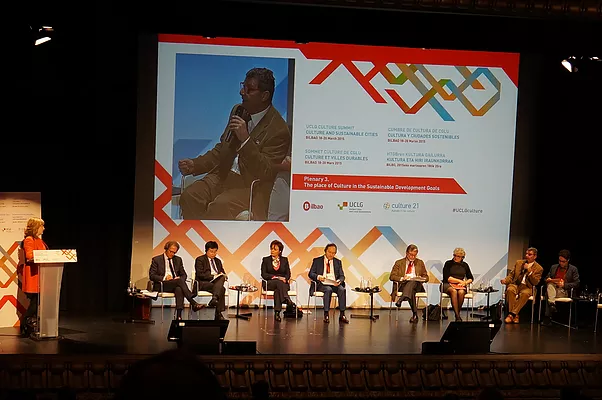
The United Cities and Local Governments Culture Summit, held in Bilbao between 18 and 20 March 2015, has served to highlight the essential role of culture in the sustainable development agenda and acknowledge the efforts made by the Global Taskforce to ensure that the voice of local and regional governments is heard in the Post-2015 process.
300 local leaders and practitioners from pioneering cities in the field of culture gathered with representatives of civil society and international organizations to debate the Summit theme of 'Culture and Sustainable Cities', and to explore ways in which local and regional governments can integrate culture into their policy-making and daily work.
A two-part plenary sesión on 19 March was dedicated to 'The place of culture in the sustainable development goals'.
There was agreement that, despite the absence of a stand-alone goal on culture in the final Open Working Group report, there are reasons for optimism. Most significantly, the #Culture2015Goal campaign created an unprecedented momentum behind culture in international forums, and forged new and valuable alliances between local governments and civil society.
Participants also applauded the prominence of culture in Goal 11 on Sustainable Cities and Human Settlements (e.g. Target 11.4 on preserving cultural heritage).
Both the Ambassador of Peru and Co-Chair of the Friends of Culture, Gustavo Meza-Cuadra, and the Deputy Director of UNESCO, Alfredo Pérez de Armiñan, highlighted the important link between cities and culture. They said that the contributions made by UCLG and the Global Taskforce in this field will act as the foundation of the work on culture that will be needed in the next phase of the definition of the agenda.
Participants in the debate emphasized the need for robust indicators to measure culture targets in order to prevent the further dilution of culture in the Agenda. Advocacy in this area forms part of the Global Task Force's ongoing work on the 'localization' of the Post-2015 Agenda, which aims to ensure that the implementation and monitoring of all goals and targets is appropriate for diverse sub-national contexts.
These new personal and digital international networks of cultural campaigners will be invaluable in future international advocacy efforts. Local government and civil society networks should take heed of this achievement and strive to build similar connections in other areas of shared policy interest.
Furthermore, while there is no stand-alone SDG on culture, cultural issues are mentioned in over half of the proposed goals, and the issue has special prominance in Goal 11 on Sustainable Cities and Human Settlements (e.g. Target 11.4 on preserving cultural heritage). Participants in the debate emphasized the need for robust indicators to measure culture targets in order to prevent the further dilution of culture in the Agenda. Advocacy in this area forms part of the Global Task Force's ongoing work on the 'localization' of the Post-2015 Agenda, which aims to ensure that the implementation and monitoring of all goals and targets is appropriate for diverse sub-national contexts.
The most important outcome of the Summit is 'Culture 21: Actions', a guide to the most cutting edge local government practices to harness culture for sustainable development. Culture 21: Actions will act as the framework for the cultural work of UCLG and its members over the coming years.
The partnership between civil society and local governments was highlighted as an important instrument to ensure that the Sustainable Development Agenda is grounded at local level and can be truly effective.
Also significant was the strong emphasis given to the importance of the Habitat III Conference as concretization of the SDGs with culture as enabler and driver of development.New personal and digital international networks of cultural campaigners will be invaluable in future international advocacy efforts. Local government and civil society networks should take heed of this achievement and strive to build similar connections in other areas of shared policy interest.
Follow the Summit TweetLive #UCLGCulture
